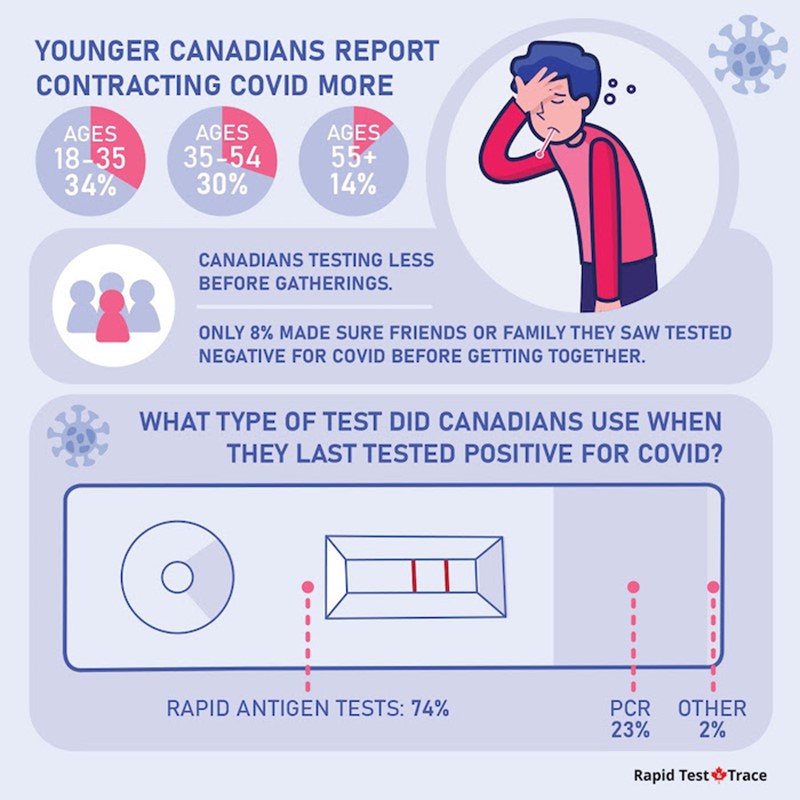
According to fresh new research commissioned by Rapid Test & Trace Canada (conducted among members of the online Angus Reid Forum just days ago), in spite of medical guidelines, most Canadians simply aren’t asking friends and family to take rapid tests before social gatherings.
In hopes of preventing more COVID-19 infections over the upcoming Mother’s Day and Victoria Day holidays, the survey looked closely at how Canadians fared with COVID over last week’s Easter/Passover holidays…
PLEASE ATTRIBUTE THIS AS A RAPID TEST & TRACE CANADA SURVEY IN ALL MEDIA MENTIONS
Key Findings of the survey (National):
1) A major drop in asking for pre-gathering COVID TESTS:
Only 8% of Canadians who celebrated Easter/Passover weekend in person made sure all friends or family they saw tested negative for COVID BEFORE getting together.
6% made sure that ‘some’ of the people they met up with tested negative on a COVID test but DID NOT ask everyone to take a COVID test.
This combined total of 14% is significantly down from the 26% who said they asked their family/friends to take a COVID test before meeting up over the winter holidays (as reported by members of the online Angus Reid Forum for a recent Rapid Test and Trace Survey conducted in March 2022).
Interestingly, 15% of Canadians say they choose to wear a mask when visiting family and friends indoors.
2) Canadians are failing to test in general
Asked how many rapid antigen tests they took during or after the Easter/Passover weekend, 78% of Canadians said ‘none.’ 13% said they took one, 8% said they took 2-3 and 1% said they took more than three.
“We want Canadians to wake up and accept that COVID isn’t over,” said Sandy White, Co-founder of Rapid Test & Trace Canada. “Our latest research is showing that Canadians failed to test for COVID before getting together over the Easter/Passover holidays. Hospitalizations are rising across the country and are currently at the second-highest level of the pandemic. Canadians need to get serious about protecting themselves and their families and friends by simply taking a COVID test before meeting up for holiday get-togethers.”
3) April COVID Contraction rates don’t appear to be much less than December and January’s:
About the same proportion of Canadians reported getting together with friends and family outside their households over the December and January holidays (43%) as the Easter/Passover weekend (39%).
27% of Canadians who gathered over the Easter/Passover weekend reported meeting up with 10 or more friends and family, 35% met up with 5-9, and 38% met up with fewer than five.
4) Younger Canadians more likely to report contracting COVID than older age groups:
Asked if they have ever tested positive for COVID, 34% of Canadians aged 18-34 said ‘yes’ on the recent survey vs. 30% of 35-54 year-olds and 14% of 55+ year-olds.
5) Canadians appear less worried about family and friends contracting COVID from recent gatherings:
Asked if they are worried that they or someone in their group of family and friends contracted COVID from a recent gathering over the Easter/Passover weekend, 2% said ‘they were almost certain that this happened and 5% said that ‘this probably happened.’ This is less than the 13% who were concerned that they or someone in their group had contracted COVID during a holiday gathering in December/January (based on the March survey.)
6) Most Canadians who have tested positive for COVID used a rapid test for their most recent result:
Asked what type of COVID test they used when they last tested positive for COVID, 74% of COVID Positive Canadians said rapid antigen tests vs. 23% for PCR tests and 2% who reported using some other test. This marks a significant increase in usage of rapid tests from early March when only 57% reported using one when they last tested positive for COVID.


